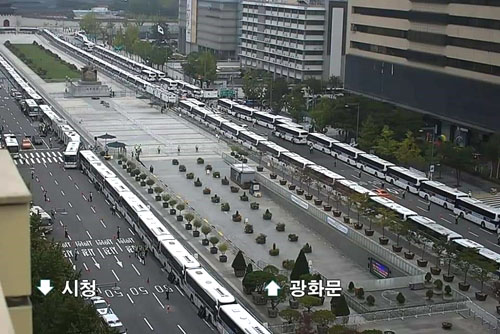by WorldTribune Staff, October 6, 2020
While bolstering its security ties to China, the administration of leftist South Korean President Moon Jae-In has clamped down on patriotic and anti-government demonstrations in Seoul.
The Moon administration coordinated with the Chinese Communist Party (CCP) on a high-ranking security forces training class in November of 2019, a report revealed.

“The purpose of the training was known as a high-level exchange training program between South Korea and China to strengthen the public security cooperation relationship,” East Asia Research Center reported.
Part of the program reportedly included discussions on the Chinese political situation and anti-terrorism measures in China. So-called “anti-terrorism” measures undertaken by the communist government of China includes the detention of more than 1 million Muslim Uighurs in Xinjiang concentration camps.
The training sessions between South Korean and Chinese security personnel were held to broaden the “understanding of the police system between the two countries as well as effective combined countermeasures against international crimes. In particular, public security cooperation between the two countries is expected to be further strengthened,” the report said.
During the training sessions, participants studied subjects such as the Chinese police system, Chinese judicial system, large-scale security activities, cyber crime investigation, and the investigation process and evidence collection. Also studied was Chinese culture including language, calligraphy, and Tai Chi.
The newly minted security cooperation between South Korea and China was highlighted last month when South Korean Prosecutor General Yoon Seok-Yeol met with Chinese Ambassador to South Korea Xing Hai Ming.
In the Sept. 25 meeting, Yoon reportedly said: “I hope strengthening exchanges, cooperation, and links with China in the law enforcement sector can help develop and deepen the strategic partnership between South Korea and China.”
On Oct. 3, the Moon administration deployed 11,000 police, 300 police buses, and 90 checkpoints to block people from gathering in Gwanghwamun Plaza (Syngman Rhee Plaza) for a protest rally against Moon, Justice Minister Choo Mi-Ae and election fraud issues, Tara O reported for East Asia Research Center.
The government’s crackdown came after it arrested and jailed three rally organizers and threatened arrests, fines, and car towing, the report said.
“Although the government’s stated reason was for ‘public health’ related to coronavirus, there were no efforts to block crowds in other places, such as amusement parks, markets, bars, night clubs, the subway, and elsewhere,” East Asia Research Center noted.
Observers noted that while the government stepped in to stop the Oct. 3 anti-government protest in Seoul, it did nothing to interrupt an Oct. 4 rally held two hours outside of Seoul for leftists seeking to free imprisoned progressive politician Lee Seok-Ki.
There were no police, no checkpoints, no threats of arrest and “no police searching people for Korean Taegukki flags,” one observer told WorldTribune.com.
In 2015, Lee Seok-Ki was found guilty of instigating an armed rebellion and violating the National Security Law. Lee, who was then a lawmaker of the now-outlawed far-left Unified Progressive Party (UPP), was sentenced to 9 years in prison.
The observer added of the Oct. 4 rally:
“Remember, this was just 24 hours after Moon ordered a police-enforced prohibition of any conservative protests in Seoul.
This was just 24 hours after the government decreed that no more than 9 cars could participate in an anti-Moon parade.
This was just 24 hours before 11,000 police were called out and 90 roadblocks were set up to turn potential anti-Moon car parade protesters away from Seoul.
This was just 24 hours before cars and even pedestrians in downtown Seoul were being searched for Korean Taegukki flags and anti-Moon signs. This was just 24 hours after groups of even three and four people in the center of Seoul near Gwanghwamun Plaza, suspected of being anti-Moon protesters, were being immediately and forcibly dispersed by police.
This was a shockingly blatant example of a politically motivated double-standard by Moon. Are Moon’s supporters now going to assert that the coronavirus is only a health risk in Seoul, and not two hours away? Will Moon’s defenders now claim that a person alone in a car, in a car parade, can somehow spread the coronavirus, but a group of dancers on a stage can not spread it? Do Moon’s supporters think we are fools? This is clearly discrimination!”
Intelligence Brief __________ Replace The Media
